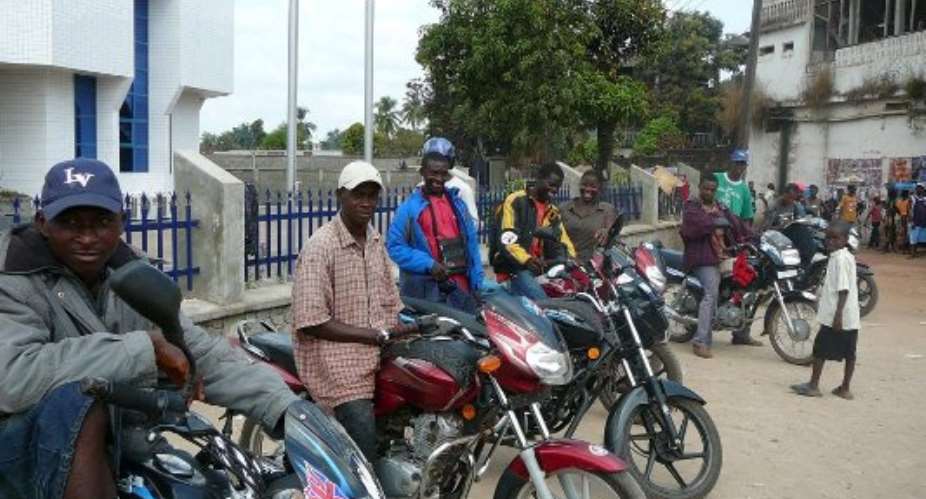Accra, Feb. 13, GNA - The Motor Traffic and Transport Unit (MTTU) of Ghana Police Service on Monday said about 148 motor bikes were involved in crashes nationwide in January alone this year.
It said 62 of the crashes were recorded in Greater Accra Region, mostly from commercial operators (although illegal), popularly known as” Okada”.
Assistant Superintendent of Police (ASP) Alexander Kweku Obeng, Head of Research, Education and Training at the National MTTU told the Ghana News Agency (GNA) in Accra.
He noted that motor bikes, according to motor traffic laws in the country, were licensed to be used exclusively for private purposes and therefore, it was unlawful for any person to use them for commercial purposes.
“The use of motor bikes has now become a 'curse' because people are now using them for commercial purposes. Most people want to make money through criminal means at the expense of other people's lives,” he added.
ASP Obeng stated that motor bikes had been one of the major causes of road crashes, as well as the main source of injuries to victims at most of the accident centres in the country's hospitals.
He explained that apart from the private use of motorcycles, they were restricted for usage by licensed 'A' holders only, adding that riders without a helmet and registered number plates would be arrested and prosecuted.
ASP Obeng explained that the dangers of motor cycle usage was not associated with commercial operators alone but with private users, adding that there were instances where some private riders breached the traffic regulations, including disregarding red lights in traffic.
“Such persons are as guilty as the commercial operators,” he added.
ASP Obeng said the MTTU would sustain the arrest of such deviant operators in the country with 248 persons already convicted and fined for several road traffic offences as at the end of January, 2012.
He mentioned that the efforts towards ending the” Okada” business was not for the Police alone but would take an educated and a well-disciplined individuals in the society to assist. "People should be educated on the dangers in using motor cycles on the roads, especially in the cities," he added.
ASP Obeng stressed the need for the Government to provide an efficient, reliable and time-bound transport system for passengers to help completely eliminate “Okada” out of the cities.
Meanwhile, some Okada operators within the Central Business District in Accra in an interview with the GNA reiterated their call to government to legalise their operation since it served as a source of income to them.
Mr Daniel Marfo, an Okada operator said he was aware of the Police's arrest. In Accra, most operators usually ply on routes around Tema Station, Korle Bu Teaching Hospital and Teshie which did not have security presence.
“The Police sometimes confront us, they arrest us and seize our ignition keys and tell us our service is not legalised and therefore we cannot operate,” he added.
Mr Marfo said usually he operated around Accra Central and General Post Office and had massive patronage due to the traffic situation at those areas.
He added that most of them used petrol for their motor cycles, adding that the fares varied depending on the destination of their passengers.
Some passengers said they knew the risks involved in patronising such services but had no choice, adding that it was more convenient, faster and though more expensive compared to "trotro" (commercial transport), they would defy all odds as long as it would take them to their work places on time.
GNA





 Whoever participated in the plunder of the state must be held accountable – Jane...
Whoever participated in the plunder of the state must be held accountable – Jane...
 A vote for John and Jane is a vote to pull Ghana from the precipice of destructi...
A vote for John and Jane is a vote to pull Ghana from the precipice of destructi...
 I’ll repay your abiding confidence with loyalty, understanding and a devotion to...
I’ll repay your abiding confidence with loyalty, understanding and a devotion to...
 ‘I’ve learnt deeply useful lessons for the future' — Serwaa Amihere breaks silen...
‘I’ve learnt deeply useful lessons for the future' — Serwaa Amihere breaks silen...
 I’m sorry for the embarrassment – Serwaa Amihere apologises for leaked sex video
I’m sorry for the embarrassment – Serwaa Amihere apologises for leaked sex video
 Dumsor: Matthew Opoku Prempeh not in charge of Energy sector – Minority
Dumsor: Matthew Opoku Prempeh not in charge of Energy sector – Minority
 Adu Boahen’s murder: Police arrest house help who was in possession of deceased’...
Adu Boahen’s murder: Police arrest house help who was in possession of deceased’...
 Akufo-Addo nominates Felicia Attipoe as Tema West MCE
Akufo-Addo nominates Felicia Attipoe as Tema West MCE
 Election 2024: I can't have someone I defeated twice as my successor – Akufo-Add...
Election 2024: I can't have someone I defeated twice as my successor – Akufo-Add...
